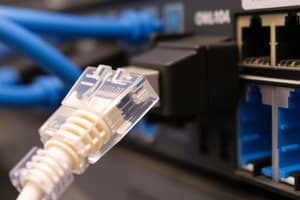Podcast
Questions and Answers
What is the main function of Ethernet ports in routers?
What is the main function of Ethernet ports in routers?
- Regulating internet speed
- Controlling network security settings
- Providing wireless connectivity to devices
- Serving as entry points for Ethernet signals (correct)
How do Ethernet ports contribute to networking efficiency?
How do Ethernet ports contribute to networking efficiency?
- By restricting data transfer across LANs
- By allowing data transfer across LANs (correct)
- By reducing the number of connected devices
- By limiting the speed of data transmission
Why do different models of routers have varying numbers of Ethernet ports?
Why do different models of routers have varying numbers of Ethernet ports?
- To cater to diverse requirements (correct)
- To reduce the compatibility with various devices
- To limit the devices that can connect
- To regulate internet speed
Which of the following is NOT a common Ethernet speed for ports in routers?
Which of the following is NOT a common Ethernet speed for ports in routers?
Why is it important for Ethernet ports in routers to operate at different speeds?
Why is it important for Ethernet ports in routers to operate at different speeds?
In what type of routers would you typically find upwards of thirty-two Ethernet ports?
In what type of routers would you typically find upwards of thirty-two Ethernet ports?
What is the primary role of Ethernet ports in routers?
What is the primary role of Ethernet ports in routers?
How do Ethernet ports help in network traffic management?
How do Ethernet ports help in network traffic management?
What recent advancement has been made in Ethernet port technology?
What recent advancement has been made in Ethernet port technology?
Why is monitoring port usage important in network management?
Why is monitoring port usage important in network management?
What is a key challenge in managing multiple Ethernet ports in routers?
What is a key challenge in managing multiple Ethernet ports in routers?
How do Carrier Ethernet services differ from traditional LAN environments?
How do Carrier Ethernet services differ from traditional LAN environments?
Flashcards are hidden until you start studying
Study Notes
Ethernet Ports in Routers
Ethernet ports are integral parts of modern-day networking infrastructure. They serve as interfaces where different types of network cables connect devices like computers, servers, switches, and routers within a Local Area Network (LAN). This article focuses on Ethernet ports, particularly in routers, examining their functionality, importance, and operational aspects while highlighting the broader context in which they contribute to overall networking efficiency.
Understanding Ethernet Ports and Their Functionality
Ethernet ports are found in various types of network devices, including routers. These ports act as entry points for incoming and outgoing Ethernet signals, allowing data transfer across LANs. Different models of routers may have varying numbers of Ethernet ports, catering to diverse requirements. For instance, home routers typically have four to eight Ethernet ports, while enterprise-level routers might feature upwards of thirty-two Ethernet ports.
One essential aspect of Ethernet ports is their ability to operate at different speeds, depending on the specific hardware configuration. Common Ethernet speeds include Fast Ethernet (100BASE-TX), Gigabit Ethernet (1000BASE-T), and even higher speeds like 10 Gigabit Ethernet and 40 Gigabit Ethernet. These speed variations allow for flexible data transfer rates, ensuring compatibility with various devices and network configurations.
Importance of Ethernet Ports in Routers
Ethernet ports play a crucial role in facilitating seamless communication between devices connected to a router. They enable the exchange of data packets between routers themselves, creating a robust backbone for wider internet connectivity. By connecting multiple routers, Ethernet ports create larger networks, often spanning cities or even entire regions, effectively extending the reach of the Internet.
Moreover, Ethernet ports are vital for traffic management within a network. They help maintain optimal network flow by distributing incoming and outgoing traffic among available interfaces. This intelligent redirection of data prevents congestion on individual ports and ensures that network resources remain balanced and functional.
Advancements in Ethernet Port Technology
As technology continues to advance, so too does the functionality of Ethernet ports. For example, recent developments have led to the emergence of Software-Defined Networking (SDN) integration via Broadcast and Select (BF)-labeled router ports. This allows for enhanced routing control and flexibility, enabling dynamic adjustments to network traffic patterns.
Additionally, there has been growing interest in exploring Ethernet ports beyond traditional LAN environments. Carrier Ethernet services, driven by Metro Ethernet Forum (MEF) standards, provide cost-effective, high-performance transport networks capable of supporting various applications, including Internet Protocol Television (IPTV) traffic.
Challenges and Considerations for Ethernet Port Management
Despite their advantages, managing multiple Ethernet ports in routers presents certain challenges. Ensuring optimal utilization of all available ports while maintaining network security remains a constant concern. Efficiently monitoring port usage, detecting anomalous behavior, and troubleshooting issues are essential aspects of network management that require careful planning and skillful execution.
Moreover, as networks continue to evolve, understanding the role played by Ethernet ports becomes increasingly important. With advancements like SDN integration and the rise of Carrier Ethernet services, it is crucial to stay informed about new developments and adapt accordingly to preserve network efficiency and reliability.
In conclusion, Ethernet ports serve as a fundamental foundation for modern networking infrastructure, playing a vital role in connecting devices within Local Area Networks and contributing to the wider internet connectivity. Understanding their functionality, operational aspects, and ongoing advancements is key to ensuring seamless communication and reliable network performance.
Studying That Suits You
Use AI to generate personalized quizzes and flashcards to suit your learning preferences.




